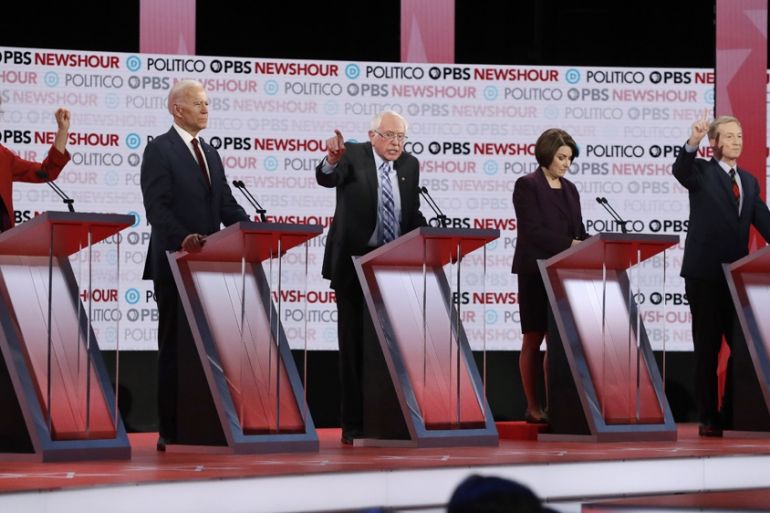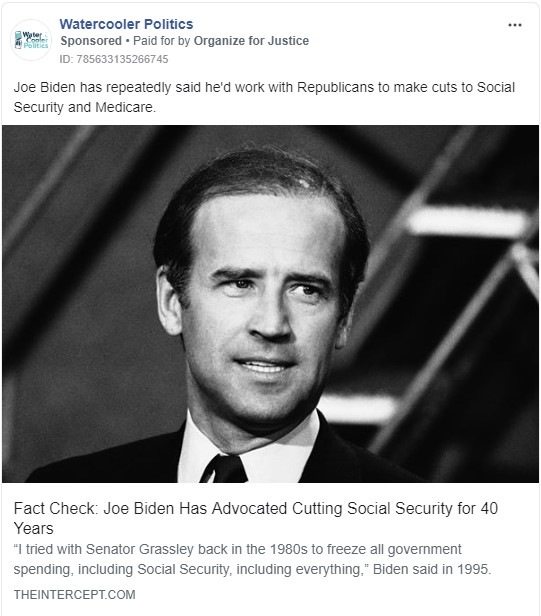US Democrats face internal strife ahead of Nevada, South Carolina
Democratic leaders find themselves bogged down in a struggle between the progressive and moderate wings of the party.

US presidential hopeful Bernie Sanders should be taking a victory lap or two following back-to-back wins in the 2020 election’s first votes. Instead, both Sanders and the party he wants to lead find themselves bogged down in a struggle between the progressive and moderate wings of the Democratic party.
Establishment Democrats are terrified of Sanders’ momentum after his popular-vote victories in both Iowa and New Hampshire. They see the independent Vermont senator, a self-avowed democratic socialist, as potentially off-putting to the moderates and independents they need to corral to defeat President Donald Trump in the general election in November.
Keep reading
list of 4 itemsTrump ally Rudy Giuliani files for bankruptcy following defamation case
‘Insurrection’ should bar Donald Trump from US presidency, lawyers argue
Ex-Proud Boys leader Joseph Biggs sentenced to 17 years for US Capitol riot
Sanders’ sweeping policy proposals, including nationalisation of the healthcare system and free university tuition, enjoy wide support among his base of mainly younger voters. And national polls suggest that support for him and his policies may be broadening, with Sanders opening up a double-digit lead over former Vice President Joe Biden, his closest competitor, in national polls taken after the New Hampshire vote.
Focus on Nevada, South Carolina after Sanders wins New Hampshire
Who are the 2020 US Democratic presidential candidates?
Sanders wins in New Hampshire, narrowly beating Buttigieg
In many ways, the Democratic party in 2020 faces the same issue that the Republicans faced in 2016. A charismatic outlier popular with the fringes of the party but disliked by its traditional base has, for the moment at least, a better chance of securing the nomination than any of his establishment challengers.
James Carville, an architect of former President Bill Clinton’s victories three decades ago, echoed the sentiments of many in the party when he described himself in an interview on MSNBC as “not very impressed” with the Democratic field and singled out Sanders for particular scorn.
“I’m scared to death. I really am,” Carville said. “If we go the way of the British Labour party, if we nominate Jeremy Corbyn, it’s going to be the end of days.”
Most voters, he added, “are looking for somebody who can come in and not just excite them, but talk about things that really matter and everyday life. They are not interested in socialism and revolution.”
Moderate Democrats in Congress, especially those elected in 2018 in districts carried by the president two years earlier, are said to be worried that the presence of Sanders at the top of the ticket could be costly to the party come November.
“There is a growing concern among especially those of us on the front lines that we will not only lose the White House but the House of Representatives,” one of them told the New York Times anonymously.
The Sanders campaign, however, says it is expanding the electorate and motivating new groups of voters to come to the polls.

The intraparty struggle is being played out both on the national stage and in the states where the next round of crucial early votes will be held over the next two weeks: Nevada and South Carolina.
In Nevada, the powerful Culinary Workers Union, which represents 60,000 workers in the hotel and restaurant industry and is predominantly Latino, attacked Sanders’ signature issue of eliminating private healthcare plans in favour of a government-run Medicare for All option and declined to endorse any candidate in the Democratic primary.
“We respect every single political candidate right now. We know they are great people,” Geoconda Arguello-Kline, the union’s secretary and treasurer, said when the decision was announced. “We’re going to endorse our goals.”
Sanders and his allies on the left, meanwhile, are not letting the establishment sniping go unchallenged. A political action committee, or PAC, with close ties to Democratic US Congresswoman Alexandria Ocasio Cortez, who has endorsed Sanders and campaigned for him in Iowa, ran Facebook ads in New Hampshire attacking Pete Buttigieg and is now running anti-Biden ads in South Carolina.
The ads, paid for by a group called Organize for Justice, called out Buttigieg for “being more concerned with protecting the status quo for his wealthy donors” than fighting for universal healthcare and called Biden a liability to the party. “Every time he steps out in public he says something embarrassing,” one advertisement states.
Organize for Justice, a so-called “dark money” PAC that is not required to disclose its donors, describes itself as a “sister organisation” of Justice Democrats, a PAC founded in 2017 by Saikat Chakrabarti, Ocasio-Cortez’s former chief of staff, and Zack Exley, a leader of Sanders’ 2016 presidential campaign. The group has spent nearly $50,000 on the ads during the first weeks of February.

The efforts of surrogates notwithstanding, most Democratic party leaders are, in public at least, doing their best to downplay the family squabbling, insisting that Democrats on the whole remain “calm, cool and collected”, as House Speaker Nancy Pelosi put it, in the face of a potentially long and protracted nomination process.
“I can hear you all say, oh, we’re all in a panic, the established Democrats. I’m like, is there some establishment that I don’t know about around here?” Pelosi told reporters at a news conference on Thursday. “We respect the process. The people will winnow the field.”
